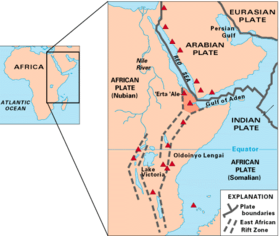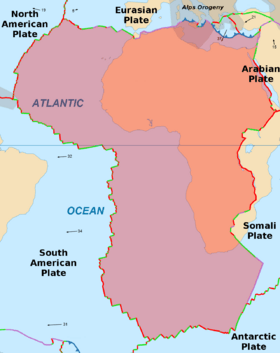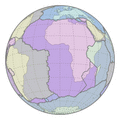African Plate facts for kids
The African Plate is a major tectonic plate. It includes much of the continent of Africa, as well as oceanic crust which lies between the continent and various surrounding ocean ridges. Since the continent of Africa includes both the African and the Somali plates, some literature refers to the African Plate as the Nubian Plate to distinguish it from the continent as a whole.
Between 60 million years ago (mya) and 10 mya, the Somali Plate began rifting from the African Plate along the East African Rift.

One hypothesis suggests a mantle plume beneath the Afar region. Aother hypothesis suggests the rifting is just a zone of weakness as the plates to its east move northwards.
The African Plate's speed is about 2.15 cm (0.85 in) per year. It has been moving over the past 100 million years or so in a general northeast direction. This is drawing it closer to the Eurasian Plate. There is subduction where oceanic crust meets continental crust (in parts of the central and eastern Mediterranean).
Along its northeast margin, the African Plate is bounded by the Red Sea rift where the Arabian Plate is moving away from the African Plate.
The African, Somali and Arabian Plates were once all part of the great Gondwana southern supercontinent, as was the Indian subcontinent.
Images for kids
-
Today, the African Plate is moving over Earth's surface at a speed of 0.292° ± 0.007° per million years, relative to the Earth's "average" crust angular velocities (see NNR-MORVEL56)
See also
 In Spanish: Placa africana para niños
In Spanish: Placa africana para niños



